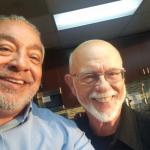Acts 15 is part of a larger story involving the entire Early Church. “Judaizers” come to Antioch to tell Paul, Barnabas, and the Church that they must follow the Jewish Law. So Paul and Barnabas go to Jerusalem to consult with the Apostles and presbyteries (verses 1-4).
In a conversation with a lady along The Way to or from San Francisco (who is part of GTU) I find myself being questioned about this very topic.

I must say at this point “Judaizers,” and possibly certain religious elite, are working in tandem with the politico circa the time of Christ, to the best of my knowledge. They are attempting to make Christians become Jews, or Gentile Christians (their neighbors) become something like God-fearers (people recognized by the house so to speak like Cornelius; Acts x through xvi).
There’s nothing wrong with political and religious leanings.
To be honest, from what I’ve learned, I believe the remarks Jesus made against the Temple were crucial, from a Jewish mindset, and why would they not be?
Let’s be real if we can establish the fact the NT Church is mostly considered a sect of Judaism.
We can look back and say neither the “Judaizers” nor the growing sect of Christ followers reflected the views of the entire nation and people of God around the world at the time.
Therefore, it is certainly my intent is to honor the people of God, while remaining true to the New Testament narrative.
vignette
Certainly, there are some aspects of the MCU unbeknownst to us in America. Some of us dropped into a library in the Dakotas and from what was read, the stories nearly sound like parallels to God stories, perhaps even Trinitarian; but I digress. There were other characters who amused us besides Loki.
I almost bought the book set for one of my three sons who would enjoy the read.

The language may be just a little too rich for me.
Yet I imagine he could read and say the words with the proper verbosity and dialect. Perhaps I could invite him into another In Dialogue for us.
- Do these ancient explorers really liken the lore to stories from the holy writ?
- Do the Greeks draw from the times of Moses?
- Is there a network between those in Ur and Abraham continuing for generations?
I’ll have to keep thinking about it all, but I have to believe somewhere up there, all these things are somehow connected.
If nothing else, ancient myths can and often do prepare the way for the story of Christ. Other stories in later eras could and often do blend elements of the story of Christ, as a way of fishing for men and women.
One more ex.: my son’s namesake is an excellent storyteller and has read countless classic works including La Divine Comédie
We were discussing the story as a common read, and he said, “Yeah, the first time I read it…”
I love it when he starts discussing great works. Sheer brilliance in these stories and they never cease to amaze me.
in Acts x through xv
Certain members of those who name the name of Christ argue against those who are reporting about their evangelistic endeavors.
The Apostle Simon-Peter recognizes salvation among the nations outside of every traditional religious observance: “because the Master Jesus amazingly and out of sheer generosity moved to save us just as he did those from beyond our nation” (verses 5-11).
Paul and Barnabas share narratives about anomalies among the nations (verse 12).
Afterwards James, seemingly the facilitator of the council, makes a further contribution to the dialogue.
In advance of this quote, I’d like to add there is difficulty among us when Passages like this either free us too much, or constrain us.
none of us were there, no matter how great our socio-historical hermeneutics are
“One must interpret the OT or NT command in light of its own social, political, and religious context. Before one can decide if and how a biblical rule applies to his day, he must first understand it in its own day.”[1]
Nonetheless, I believe in various forms of Biblical interpretation.
I do believe in reading communities; as do many post-critical commentators. It is becoming clearer to us, present day reading communities are similar to the some learning processes in the First Century.
In effect, this particular council (often called the Council of Jerusalem) considers Scripture, continues the conversation, and offers somewhat of a reprieve (although this term could be used different ways).
The council exhibits a commitment to historical interpretation of Scripture, as reps of new Christocentric reading communities. They establish a newfound landing; to make room for Gentiles who associate with Jesus Christ.
The Father of Latin Theology states:
“The reason why the Holy Spirit did, when the apostles at that time were consulting, relax the bond and yoke for us, was that we might be free to devote ourselves to the shunning of idolatry.”[2]
In retrospect there are various ways to interpret the Scripture and the commentators who are perhaps closest to the Scripture.
This is also true with translators like the one above who works in the 1800’s with a quite different vocabulary (i.e. a little artistic liberty is taken with “shunning” because its etymology only has roots in English, not Latin).
People groups interpret the Word and Latin commentators differently, yet hopefully remain within the greater house of interpretation.
Tertullian seems to be declaring of the council, Gentiles are welcome at the table now, not only as neighbors. Their restraints won’t be as stringent, and there is freedom in the council’s decision.
Judeo-Christian ethics at least hold to the new decisions in Acts xv
No one is really dismissed from the decision in Acts xv, at least among the new Christians.
However, Christian Jews who want to practice the Mosaic Law to the nth degree are not forbidden to either. The understanding is the law does not completely save in the new era of Christ, and I would think Hebrew writings point to the fulfillment during the time of the Messiah (Greek: Christos) as well.
Somewhere in the ethical decision-making process, our predecessors recognize the hand of the Holy Spirit and set principles in motion affecting us to this day.
Acts xv on sex
In some instances, as part of idol worship, people could hire an acolyte. And then one thing could lead to another only in particular religions.
Some link “fornication” to particular forms of idolatry (i.e. fertilization cults and Ephesus in particular).
Yet I see in the New Testament readings a term found in conjunction with only the physical act of sex outside the bounds of a type of marital bond protected within Scripture.
The evangelist Paul, or his entourage, eventually set forth other precautions for Christian leaders, and also for homes in 1 Corinthians vii; possibly after the council in Acts xv
What do you know about Judeo-Christian ethics in the First Century?
notes:
[1] John S. Feinberg and Paul D. Feinberg, Ethics for a Brave New World (Wheaton, IL: Crossway Books, 1993), p. 34.
[2] Tertullian, On Idolatry XXIV













